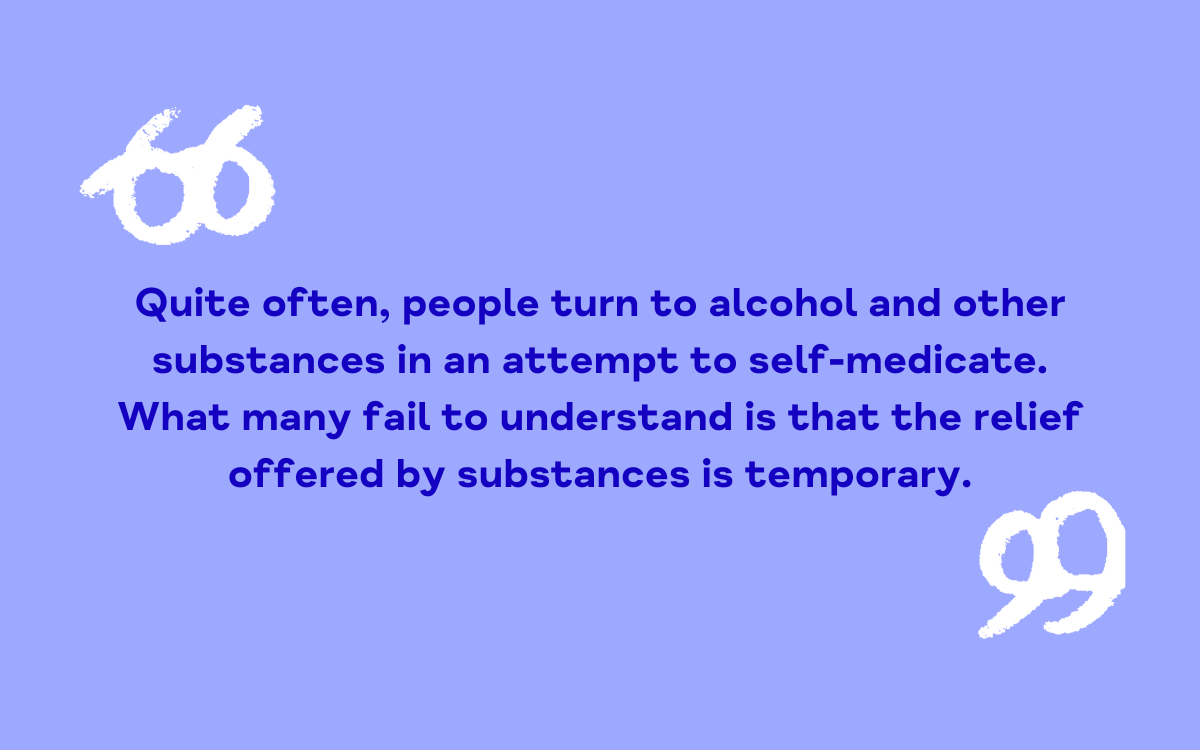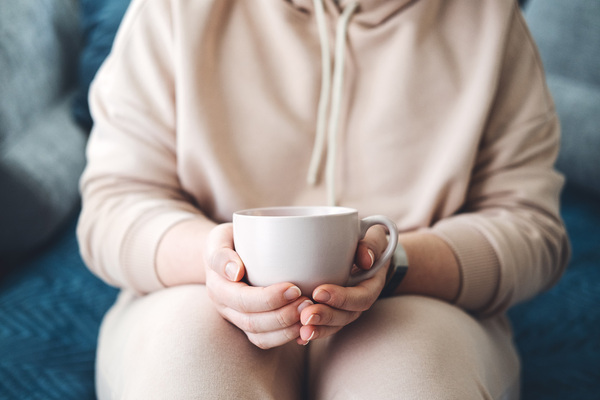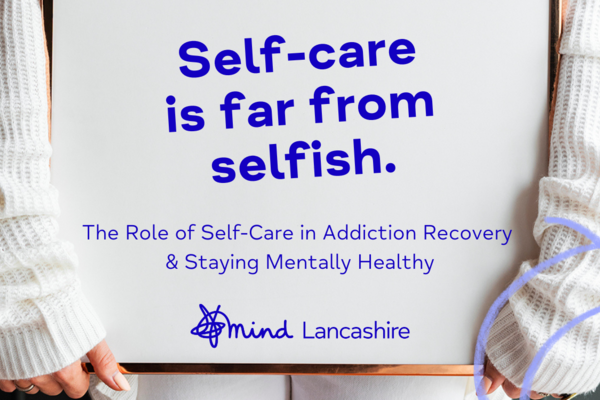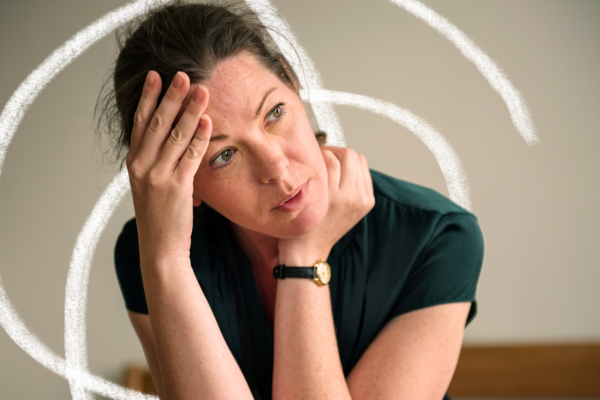*Trigger warning – this blog touches on the subjects
of addiction, alcohol and substance abuse*
This is an individual's story and we recognize that everyone's experience of mental health and everyone's circumstances are different. Any recommendations are made the guest writer, not Lancashire Mind.
The Role of Self-Care
Self-care can have an enriching effect on life and can prove helpful in dealing with challenges. Although it often gets cast aside due to responsibilities and busy schedules, self-care can help us increase in efficiency. It can actually help us perform our duties well.
Author: Noah Jones (rehabguide.net)
Mental illness is growing worldwide. Despite the growing mental health needs, the help available is insufficient. The World Mental Health Report released by WHO in 2022 calls for an increase in the commitment to mental health. Addressing mental health issues is vital, especially now.

The Connection Between Mental Health and Addiction
Untreated mental health issues can contribute to addiction. Quite often, people turn to alcohol and other substances in an attempt to self-medicate. What many fail to understand is that the relief offered by substances is temporary. Over time, substances can worsen an existing mental health condition, and they can even contribute to the development of a new mental health condition. A person who is struggling with a substance use disorder as well as a mental health disorder will receive a dual diagnosis.
Self-care and Its Components
Self-care is the cultivation of, and adherence to, behaviours that promote holistic well-being. It requires conscious efforts and prioritisation. You need to make time for self-care to function at your most optimal level. Self-care has several components: mental, emotional, physical, environmental, spiritual, recreational, social, financial, and even professional. For overall well-being, we should practice at least one activity for each component of self-care daily.
How Self-Care Affects Mental Health
Indulging in self-care can positively affect your mental health. Some self-care activities can help lower stress significantly. Emotional regulation becomes easier with targeted self-care activities. You can set healthy boundaries and achieve a balance between work, family, and leisure. Self-care can help nurture the ability to stay mentally healthy and prevent the onset or aggravation of many mental health conditions

Role of Self-Care in Addiction Recovery
The process of addiction recovery is long and riddled with many challenges. Self-care can make it easier to overcome those challenges and go through the recovery process. Read on to find out how self-care assists addiction recovery.
Improving mental health:
As mentioned above, mental health, addiction, and self-care are all interlinked. Self-care enhances self-esteem, which is beneficial for the recovery process. Stress can be a relapse trigger, and taking care of yourself regularly can help keep stress levels down.
Regaining physical health:
Substance misuse has several negative consequences on physical health. Sleep issues, weakening of the immune system, and high blood pressure are just a few of the consequences of long-term consumption of alcohol. Self-care can help overcome these issues and others like this. It can help undo most or some of the damage wreaked on the body by substances. Regaining physical health will facilitate recovery.
A coping mechanism and a tool for relapse prevention:
Self-care serves as a protective barrier against uncertainty, stress, and unforeseen challenges. People often take the help of substances to numb painful and difficult emotions. Self-care strategies provide ways of dealing with these emotions in sobriety. It helps combat many of the relapse triggers like boredom, exhaustion, depression, and stress.
Routine and structure:
Self-care requires commitment and a structured routine. Cultivation of self-care habits can occupy the mind, distract from cravings, and help establish a good routine. Self-care provides a sense of purpose as well as a sense of accomplishment. Recovery becomes easier with routine and structure in life.
Long-term well-being:
Self-care will lead to long-term well-being; self-care habits and improved well-being will go beyond the recovery process. Enhanced long-term well-being is the goal of the addiction recovery process, and self-care helps achieve that.

For people struggling with severe addiction, it is important to seek professional help. Rehab Guide can help find a suitable alcohol rehab in Lancashire. Self-care alone is not enough; it can accelerate the recovery process that mainly consists of other evidence-based established treatment procedures. It is common practice to incorporate self-care activities in addiction treatment programs.
Therapists, counsellors, and support groups play an important role in the recovery process. You can improve your mental health significantly by expressing your feelings when you need to or whenever you are overwhelmed. It might be easier to speak to therapists, coaches, or peer listeners online, as there are no time and location constraints in this option.
For complete recovery from addiction, and to lead a fulfilled life, prioritise self-care. Self-care is far from selfish. We can care better for others when we care for ourselves first.
If you have been affected by the topics covered in this blog there is help available:
Mind - Therapy or Counselling. Looking for therapy can be daunting. Mind can point you in the right direction to find free or low-cost therapy.
Mind - Recreational drugs, alcohol and addiction. List of organisations who offer support for recreational drug and alcohol addiction, including organisations who can help if you are supporting someone else.
If you would like support in managing your mental health, our Wellbeing Coaches are here to help:
Wellbeing Coaching is a goal-focused approach designed to support you in improving your wellbeing and to equip you with the tools to manage stress, low mood, anxiety, and other mental wellbeing concerns.
Virtual Wellbeing Coaching- this is a free, 1-to-1 service, available to all adults in Lancashire.
Adult Wellbeing Coaching - this is a costed, 1-to-1 and face-to-face service, available to all adults in Lancashire.





